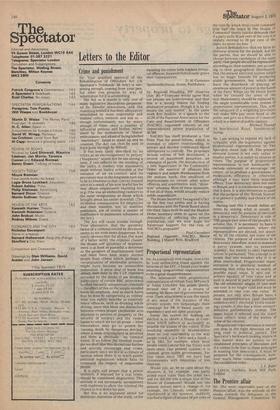Letters to the Editor
Crime and punishment
Sir: Your qualified approval of the Rehabilitation of Offenders Act ('A Spectator's Notebook' 26 July) is surprising enough, coming from your pen, but what you propose by way of substitution for it is astonishing.
The Act as it stands is only one of '44 many legislative absurdities perpetrated by frenetic innovators, and the reasoning behind it has been adequately demolished by more responsible and realistic critics, eminent and less so — though unfortunately not by many enough of them, since a number of influential persons and bodies, intimidated by the momentum of 'liberal' enthusiasms and afraid of being labelled 'reactionary', failed to stand up and be counted. The Act can thus be said to have gone through by default.
It has' been fairly described by its critics as an encouragement to perjury ('blasphemy' would not be too strong a term, if one reflects on the wording of the oath); it renders true statements made without malice actionable at the instance of an ex-convict; and its provisions may in the long term turn out to be no kindness to that convict himself since as a result of his now lawful lies he' may obtain employment exposing him (e.g. if he was an embezzling cashier) to the same temptations as those which brought about his earlier downfall. (The incidental consequences for employers and their insurers, not to mention publishers, are of course a matter of indifference to passionate reformers of the law.) The Act will cause trouble enough. Your alternative, that the ignominy factor of a criminal record be devalued, seems to me even more dangerous. It is surely obvious that for all but (for want of a better term) 'the criminal classes' the shame and ignominy of imprisonment is at least as powerful a deterrent as the prospect of imprisonment itself and must have kept many normal people from crimes which, perhaps in circumstances of intolerable pressure, might have become an irresistible temptation. A great deal of harm has already been done by the V.I.P. treatment accorded by the media (I am thinking particularly of certain BBC interviews) to often blatantly unrepentant criminals — the effect of this on the simple-minded needs no emphasis. And as much harm may be done by categorising as 'crimes' what you rightly describe as relatively minor offences, such as drinking while driving, since this blurs the distinction between crimes proper (deliberate acts injurious to persons or property or the security of society) and the casual lapses to which we are all prone — even teetotallers may go to prison for 'causing death by dangerous driving', where a mere misjudgment is involved and there is obviously no criminal intent. If we follow the Swedish example we shall blur this distinction further and actively encourage real crime, particularly since we live in a climate of opinion where there is so much purely political legislation which fails to command the respect of responsible people.
It is right and proper that a prison sentence, if imposed for a real crime, should be considered disgraceful. This attitude is not necessarily inconsistent with readiness to allow the criminal the chance to live down his past.
But this is no argument either for deliberate, distortion of the truth, or for equating his crime with hapless technical offences, however fortuitously grave their consequences.
D. H. Cameron
Spoutwells House, Scone, Perthshire.
Sir: Reginald Maudling, MP observes (July 26):4`Everyone would agree that
our prisons are overcrowded, and that this is a strong reason for finding alternative penalties, though it is by no means the only reason". In the same week Roy Jenkins, in a speech to the AGM of the National Association for the Care and Resettlement of Offenders (NACRO), expressed concern at our unprecedented prison population of 40,500.
NACRO has itself produced a Ten Point Plan for penal reform, which is intended to relieve overcrowding in prisons and develop' community-based alternatives to custody. The proposals include reform of bail procedures, a review of maximum penalties, an extension of parole, the introduction of a new Supervision in the Community Order, the removal of offences like vagrancy and simple drunkenness from the statute book, the abolition of imprisonment for certain other minor offences, and experiments with "diver sion" schemes. Most of these measures, if not all of them, would actually reduce public expenditure.
The Home Secretary has agreed to-act on the first two points and is 'having
discussions with the Parole Board about the third. Since both he and the Shadow Home Secretary seem to agree on the desirability of reducing the prison population, can we now hope for bipartisan support for the rest of NACRO's proposals?
Paul Cavadino Regional Organiser, NACRO, Manor Building, 2 Manor Row, Bradford













 Previous page
Previous page